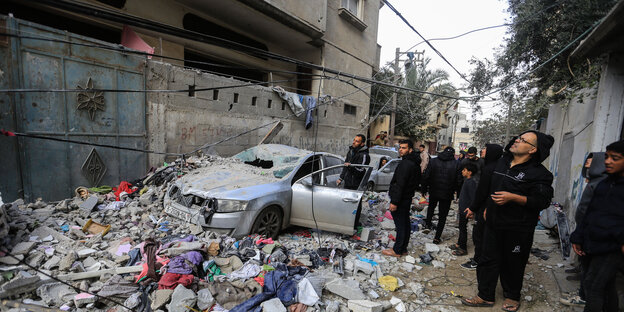The UN Secretary General has repeatedly called for a ceasefire to avoid a tragedy in Rafah. More than 27,000 people have died in Gaza since the war began.

Damage and debris on February 9 in the city of Rafah in the southern Gaza Strip. Photo: Mohammed Talatene/dpa
Almost 28,000 people killed in the Gaza Strip
According to health authorities, a total of 27,947 people were killed in Israeli attacks on the Gaza Strip. Additionally, 67,459 Palestinians have been injured since the start of the war. In the last 24 hours alone, 107 people were killed and 142 injured. The number of victims could be much higher as many people are missing and believed to have been buried under the rubble of destroyed buildings. (rtr)
US strikes Houthi targets again in Yemen
The US military has carried out new airstrikes against Houthi rebels in Yemen. U.S. Central Command said Friday that four explosives-laden unmanned ships and seven mobile cruise missile launchers that could target ships in the Red Sea were destroyed on Thursday.
The weapons posed an imminent threat to US Navy ships and commercial vessels in the region, Central Command said. “These measures will protect freedom of navigation and make international waters safer for U.S. Navy ships and commercial vessels.” The Houthis did not acknowledge the losses.
Since November, rebels have repeatedly attacked ships in the Red Sea, apparently due to the Israeli offensive in Gaza. The targets were often ships that had little or no clear connection to Israel. The attacks threaten maritime traffic on a major trade route between Asia, the Middle East and Europe. In recent weeks, the United States and Britain, supported by other allies, have carried out airstrikes against Houthi missile arsenals and launch platforms. (dpa)
Biden: Israel's actions in Gaza are “excessive”
US President Joe Biden has described Israel's military action in the Gaza war as “excessive”. Biden said Thursday night (local time) at the White House that he would continue to work “tirelessly” to persuade Israel and Hamas to take a longer break from the fighting. He is also working to ensure that many more humanitarian aid deliveries reach the Gaza Strip than before. He talks about it on the phone with Qatar, Egypt and Saudi Arabia.
He is currently trying “tirelessly” to reach a new agreement on a ceasefire and the release of dozens of Hamas hostages who were kidnapped in the Gaza Strip during their terrorist attack on Israel on October 7. In exchange for a new deal, Hamas has demanded that Israel release hundreds of Palestinian prisoners and end the military offensive in the Gaza Strip. Israeli Prime Minister Benjamin Netanyahu rejected it. (ap)
Israel: 30 rockets fired from Lebanon
After the Israeli attack on a leader of the Islamist Hezbollah militia in Lebanon, around 30 rockets were fired at Israel from that country. The rockets were fired from Lebanon on Thursday night at the Ein Seitim and Dalton areas of northern Israel, an Israeli army spokesman told the news agency. afp. According to current knowledge, no one was injured.
According to Lebanese security circles, a Hezbollah commander had been seriously injured when his car was hit by an Israeli rocket as it entered the southern Lebanese city of Nabatea. Until now, Nabatea had largely been spared from clashes between Hezbollah and the Israeli army that had raged for months.
Hezbollah has periodically attacked Israeli army positions since the start of the war between its allied Palestinian Islamist organization Hamas and Israel. Israel is responding with attacks in southern Lebanon, particularly with drones against Hezbollah fighters. (afp)
The UN Secretary General warns about the tragedy in Rafah
The United Nations Secretary-General has called for an immediate humanitarian ceasefire in the Gaza Strip before a “gigantic tragedy” occurs in the southern city of Rafah if Israel carries out military operations there with the same intensity as elsewhere. parts of the coastal region. António Guterres said on Thursday that more than half of Gaza's 2.3 million people had been pushed to Rafah seeking safety from Israel's military offensive. “They have nowhere to go,” he said. “They live in overcrowded makeshift accommodation in unsanitary conditions, without running water or electricity.”
Guterres complained about Israel's violations of international humanitarian law, which provides for the protection of civilians and the meeting of their basic needs. But he also condemned the violations of Hamas, which killed some 1,200 people in its terrorist attack on Israel on October 7.
Asked if there was an emergency plan for civilians in Rafah to move elsewhere and whether he would push for the border with Egypt to be opened, Guterres responded: “I think we should push to prevent the tragedy instead of pushing to to make things easier.” tragedy.”
Since the outbreak of the war, Egypt has resisted calls to accept large numbers of Palestinian refugees. Cairo fears that Israel could prevent them from returning to the Gaza Strip. Egypt also warned that fighters could mix with refugees. (ap)